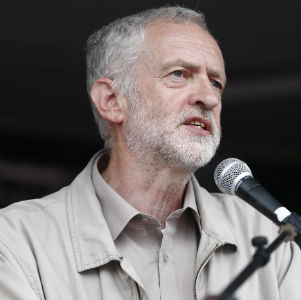Jeremy Corbyn ‘very good friends’ with preacher who compared gays to paedophiles

Labour leadership frontrunner Jeremy Corbyn described an Islamic preacher who compares homosexuality to incest and paedophilia as a “very good friend”.
Left-wing MP Mr Corbyn, who is currently the favourite to succeed Ed Miliband as leader of the Labour Party, has faced questions about his links to a number of extremist figures – though he has been a lifelong supporter of LGBT rights in Parliament.
Mr Corbyn previously dismissed criticism for referring to Hamas and other groups as “friends”, claiming it is was a symbolic gesture – but a new video has emerged from 2013, in which he explicitly describes radical preacher Ibrahim Hewitt as a close personal friend.
Hewitt is the author of controversial book ‘What Does Islam Say?’ – which compares homosexuals to paedophilia and incest.
Speaking at a meeting for the Palestinian Relief and Development Fund, Interpal, Mr Corbyn said of Hewitt: “I’ve got to know Ibrahim Hewitt extremely well, and I consider him to be a very good friend. I would think he’s done a fantastic work in leading and guiding Interpal.”
Meanwhile, Hewitt’s book says of gay people: “If people have such desires, they should keep them to themselves, and control their desires to avoid forbidden practices.
“The advice would be the same as, say, to someone who had sexual desires for minors or for close family: that having the desires does not legitimise realising them.”
Referring to homosexuality as an “abominable practice”, he claims punishments “maintain the purity of the society and to keep it clean of perverted elements, allowing for the spiritual development of its members in an ideal environment”.
It adds: “Those who seek to fulfil homosexual desires necessarily damage the very fabric of society which is why Islam condemns such practices.”
However, the preacher has denied advocating violence, claiming over a previous controversy: “I do not, as has been alleged, ‘advocate’ violence against homosexuals. What goes on behind closed doors is between the people involved and their creator.
“However, if someone decides to make a political issue of their sexuality, then surely it is only to be expected that there will be people who disagree with them.”
Leadership rival Yvette Cooper has previously accused Mr Corbyn of “legitimising” anti-gay extremists.
He hit back: “I have met people in the context of discussions about the Middle East with whom I profoundly disagree. I have met representatives of the Iranian government with whom I profoundly disagree with on the human rights issues.”
“My point is, if you’re to bring about a long-term peace process in the Middle East, you have to recognise that… you’ve got to talk to people you don’t like, don’t agree with, don’t particularly want to be in power, but you have to recognise they have a degree of support, and move on there. What’s the alternative, continuing the war?”

